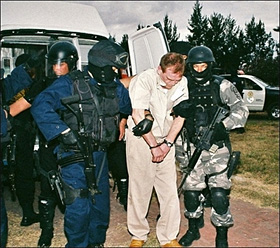 |
 |
 |
 Editorials | Issues | January 2007 Editorials | Issues | January 2007  
US, Mexico Revive Cooperation in Combating Drug Cartels
 Alexandre Peyrille - AFP Alexandre Peyrille - AFP


| | Head of the Sinaloa Cartel (northwest) H้ctor Palma Salazar is arrested by members of the Federal Agency of Investigations (AFI) of Mexico, 20 January. Mexico and the United States have entered a new era of cooperation in drug enforcement as the Mexican government handed over to Washington 11 leading suspected drug traffickers, including Osiel Cardenas, head of the feared Gulf Cartel. (AFP/PGR) |
Mexico and the United States have entered a new era of cooperation in drug enforcement as the Mexican government handed over to Washington 11 leading suspected drug traffickers, including Osiel Cardenas, head of the feared Gulf Cartel.

The group extradited to the United States on Friday also includes two leaders of the Arellano Felix drug organization and chieftains of the Sinaloa Cartel.

"This action demonstrates the government's determination to combat a wave of violence and impunity unleashed by organized crime," said an official Mexican statement.

The government insisted that eight out of the 11 handed over to US authorities were heads of criminal syndicates involved in drug trafficking.

Osiel Cardenas, who was arrested in May 2004, had continued to manage the Gulf Cartel from his high-security prison cell outside Mexico City, where he had access to a computer, cellphone, weapons and cash to bribe prison warders or order killings.

He was indicted in the United States in the Southern District of Texas on charges of conspiring to distribute large quantities of marijuana and assaulting and threatening to murder an FBI agent, a Drug Enforcement Administration (DEA) agent, and a local sheriff's deputy who was working under the direction of the US Customs Service.

The other big names in the group include Hector "Blond" Palma, the number two in the Sinaloa Cartel who was arrested in 1995, brothers Gilberto and Ismael Higuera Guerrero of the Tijuana Cartel, brothers Miguel Angel and Oscar Arturo Arriola, and Giberto Salinas, who represent the Juarez Cartel.

Washington quickly applauded the move.

US Ambassador Tony Garza praised Mexican President Felipe Calderon for his "extraordinary leadership" and "courage."

US Attorney General Alberto Gonzales was equally effusive.

"The actions overnight by the Mexican government are unprecedented in their scope and importance," he said in a statement issued in Washington. "Never before has the United States received from Mexico such a large number of major drug defendants and other criminals for prosecution in this country."

The United States and Mexico have an extradition treaty, but so far, Mexico has refrained from handing over to Washington key actors in the illegal drug trade.

However, during his election campaign, President Calderon, who was sworn in on December 1, promised to break with politics of his predecessor, Vicente Fox.

The DEA has frequently complained of insufficient cooperation on the part of Mexico in investigating the illegal drug trade and cracking down against its key actors.

Mexico has always held that the culprits had to first serve their time in Mexico before being shipped north.

Since taking over the reins of power, Calderon has launched three operations against illegal drug traffickers that involved a total of about 20,000 troops and police officers.

They targeted drug operations in Tijuana, and the states of Michoacan and Guerrero.

Similar extraditions in Colombia have unleashed a wave of violence against the government.

In Mexico, the violence so far has been limited to settling scores between members of the cartels, which fight for control of drug delivery routes going from Colombia into the United States.

About 9,000 drug-related killings have been reported in Mexico over the past six years, according to a parliamentary report. | 
 | |
 |



